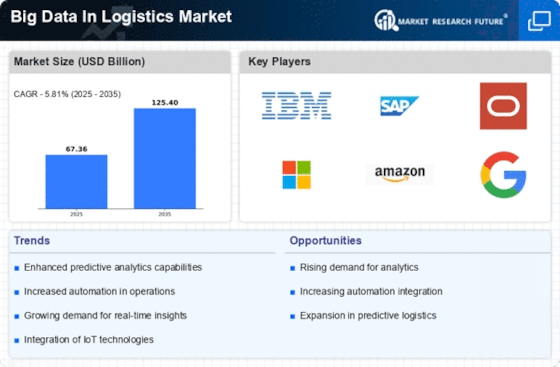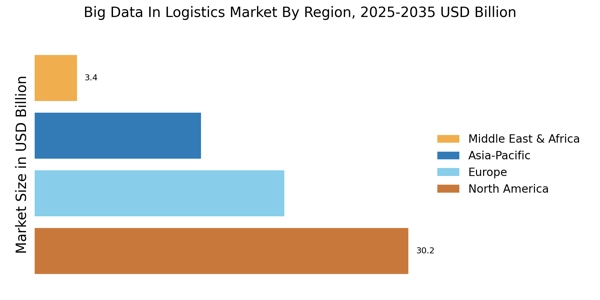Growing E-commerce Sector
The rapid expansion of the e-commerce sector is a pivotal driver for the Big Data In Logistic Market. As online shopping continues to gain traction, logistics companies are tasked with managing increased volumes of shipments and deliveries. This surge in demand necessitates the use of big data analytics to streamline operations, optimize supply chains, and enhance customer experiences. Reports indicate that the e-commerce logistics market is expected to grow significantly, with projections suggesting a valuation exceeding 500 billion dollars by 2027. Consequently, logistics providers are increasingly investing in big data solutions to meet the evolving needs of e-commerce, making it a crucial factor in the Big Data In Logistic Market.
Increased Demand for Real-Time Data
The Big Data In Logistic Market is experiencing a surge in demand for real-time data analytics. Companies are increasingly recognizing the value of immediate insights into their supply chain operations. This demand is driven by the need for enhanced decision-making capabilities, allowing businesses to respond swiftly to market changes. According to recent estimates, the market for real-time analytics in logistics is projected to grow at a compound annual growth rate of over 20% in the coming years. This growth indicates a shift towards data-driven strategies, where organizations leverage big data to optimize routes, reduce costs, and improve customer satisfaction. As a result, the integration of real-time data analytics is becoming a critical component of the Big Data In Logistic Market.
Regulatory Compliance and Risk Management
Regulatory compliance and risk management are becoming increasingly important in the Big Data In Logistic Market. As governments implement stricter regulations regarding data privacy and transportation safety, logistics companies must adapt their operations accordingly. The use of big data analytics can facilitate compliance by providing insights into operational practices and identifying potential risks. For instance, analytics can help in monitoring supply chain activities to ensure adherence to safety standards. This focus on compliance not only mitigates risks but also enhances the overall reputation of logistics firms. As such, the emphasis on regulatory compliance is likely to drive investments in big data technologies within the Big Data In Logistic Market.
Advancements in Machine Learning Algorithms
The evolution of machine learning algorithms is significantly impacting the Big Data In Logistic Market. These advancements enable logistics companies to analyze vast amounts of data more efficiently, leading to improved operational efficiency. Machine learning models can predict demand patterns, optimize inventory levels, and enhance route planning. Recent studies suggest that the implementation of machine learning in logistics can reduce operational costs by up to 15%. This potential for cost savings, coupled with the ability to enhance service delivery, positions machine learning as a key driver in the Big Data In Logistic Market. As organizations continue to adopt these technologies, the competitive landscape is likely to evolve, with data-driven decision-making becoming the norm.
Enhanced Customer Experience through Personalization
The emphasis on personalized customer experiences is a significant driver in the Big Data In Logistic Market. Companies are increasingly utilizing big data analytics to tailor their services to meet individual customer preferences. By analyzing customer data, logistics providers can offer customized delivery options, track shipments in real-time, and provide proactive communication. This level of personalization is becoming essential in retaining customers and fostering loyalty. Market Research Future indicates that businesses that prioritize customer experience can see revenue increases of up to 10%. Therefore, the drive towards enhanced customer experience through big data analytics is reshaping the strategies of logistics companies, making it a vital component of the Big Data In Logistic Market.

















